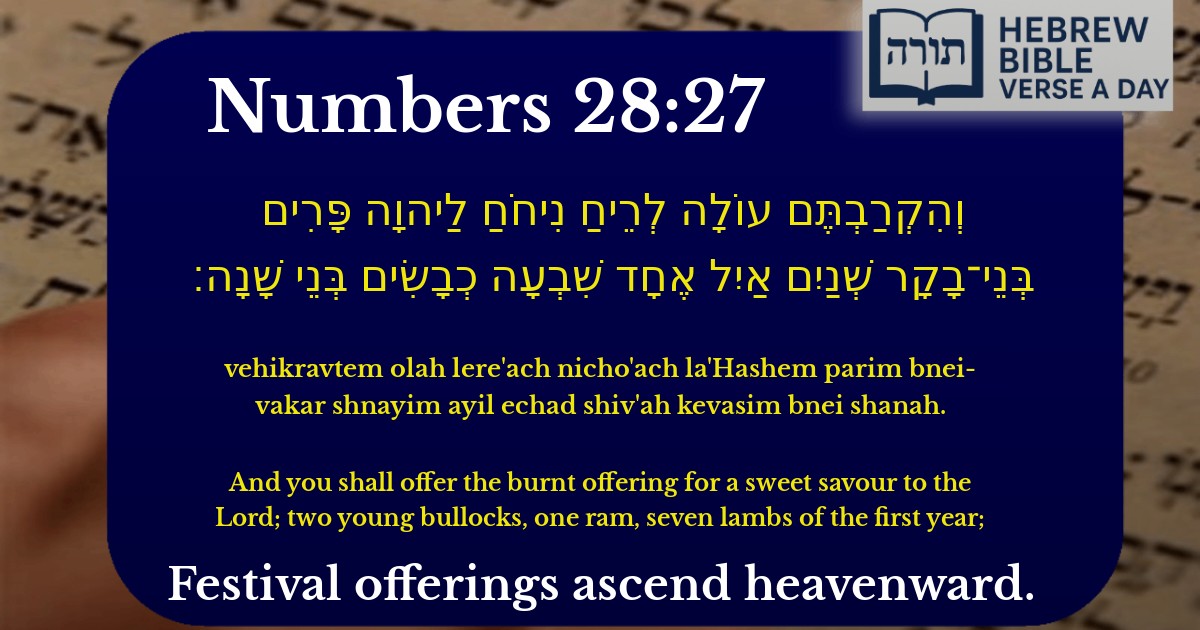Join Our Newsletter To Be Informed When New Videos Are Posted
Join the thousands of fellow Studends who rely on our videos to learn how to read the bible in Hebrew for free!
Hebrew Text
וְהִקְרַבְתֶּם עוֹלָה לְרֵיחַ נִיחֹחַ לַיהוָה פָּרִים בְּנֵי־בָקָר שְׁנַיִם אַיִל אֶחָד שִׁבְעָה כְבָשִׂים בְּנֵי שָׁנָה׃
English Translation
And you shall offer the burnt offering for a sweet savour to the Lord; two young bullocks, one ram, seven lambs of the first year;
Transliteration
Vehikravtem olah lere'ach nicho'ach la'Hashem parim bnei-vakar shnayim ayil echad shiv'ah kevasim bnei shanah.
Hebrew Leining Text
וְהִקְרַבְתֶּ֨ם עוֹלָ֜ה לְרֵ֤יחַ נִיחֹ֙חַ֙ לַֽיהֹוָ֔ה פָּרִ֧ים בְּנֵי־בָקָ֛ר שְׁנַ֖יִם אַ֣יִל אֶחָ֑ד שִׁבְעָ֥ה כְבָשִׂ֖ים בְּנֵ֥י שָׁנָֽה׃
Parasha Commentary
📚 Talmud Citations
This verse is quoted in the Talmud.
📖 Menachot 110a
The verse is referenced in a discussion about the significance of sacrifices and their pleasing aroma to God, emphasizing the importance of the offerings described in the Torah.
📖 Chullin 60a
The verse is cited in a broader discussion about the types of animals suitable for sacrifices, particularly focusing on the specifications given for burnt offerings.


Overview of the Verse
The verse (Numbers 28:19) discusses the korban olah (burnt offering) brought on the second day of Pesach (Passover) as part of the additional offerings (musaf) for the festival. The Torah specifies the exact animals to be sacrificed: two young bulls, one ram, and seven lambs in their first year. This offering is described as a "sweet savour to the Lord," indicating its acceptability before Hashem.
Explanation of the Offerings
Rashi (on Numbers 28:19) explains that these offerings are distinct from the daily tamid (continual) sacrifices and are additional to them. The two bulls, one ram, and seven lambs correspond to the unique sanctity of the festival. The Rambam (Hilchot Temidin uMusafin 10:14) elaborates that these offerings are obligatory and must be brought in addition to the korban pesach (Passover sacrifice).
Symbolism of the Numbers
The Concept of "Sweet Savour"
The phrase rei'ach nichoach ("sweet savour") is frequently used in connection with offerings. The Sforno explains that this term signifies the pleasure Hashem derives from the obedience and devotion of Bnei Yisrael in fulfilling His commandments. The Kli Yakar adds that the aroma metaphorically represents the spiritual elevation achieved through sincere service.
Halachic Implications
The Mishnah (Pesachim 6:1) and Talmud (Pesachim 59a) discuss the practical details of bringing these offerings, emphasizing that they must be brought during the day and follow specific procedures. The Rambam (Hilchot Korban Pesach 1:3) further clarifies that the musaf offerings do not override the korban pesach, and both must be brought in their proper time.